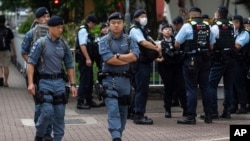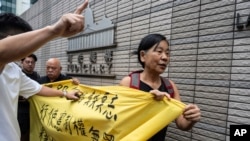Hong Kong’s High Court found 14 prominent pro-democracy figures guilty of conspiracy to subvert state power Thursday, as diplomats, foreign media outlets, and civil society organizations closely followed the verdicts in the biggest trial since China imposed the controversial national security law on Hong Kong in 2020.
Ahead of Thursday’s verdicts, 16 defendants in the subversion case, which involves 47 prominent pro-democracy activists in Hong Kong, had not pleaded guilty while 31 defendants had pleaded guilty in the hope of receiving more lenient sentences. In the end, two defendants were acquitted.
The verdicts come more than three years after police arrested the 47 prominent pro-democracy activists in a city-wide pre-raid at dawn for taking part in an unofficial primary election organized by the pro-democracy camp to select candidates running for the 2020 legislative council election.
They were later charged with "conspiracy to commit subversion" under the national security law that China imposed on Hong Kong in 2020. Authorities accused the defendants of trying to topple the Hong Kong government but the defendants argued that they were only trying to secure a majority in the legislature and used the power to veto government budgets to force the city’s chief executive to resign.
Most defendants have been denied bail and have been in detention since the trial began in March 2021. While 31 defendants in the case, including prominent pro-democracy activist Joshua Wong, legal scholar Benny Tai, and former pro-democracy lawmaker Claudia Mo, had already pleaded guilty, 16 of them didn’t plead guilty, including prominent journalist-turned-activist Gwyneth Ho and former lawmaker Leung Kwok-hung.
The prosecution of the 47 prominent figures has dealt a serious blow to the once-vibrant political activism in Hong Kong and dampened hopes of pursuing democracy in the city.
Some activists said Thursday’s verdicts didn’t come as a surprise.
"We have expected most defendants to be found guilty while maybe around two would be cleared of the charges because the government wants to offer an impression that they have considered all the evidence and handed down the verdicts in a fair manner," Patrick Poon, a visiting researcher at the University of Tokyo, told VOA by phone.
Some analysts say the verdicts Thursday show that it’s becoming extremely difficult and risky for Hong Kong’s civil society to organize activities similar to the unofficial primary. The verdicts show that "the use of peaceful means to pressure the Hong Kong government could become a criminal activity," Eric Lai, a research fellow at the Georgetown Center for Asi Law in the United States, told VOA by phone.
Due to the huge amount of attention on the case, Hong Kong authorities deployed heavy police presence to areas around the court. Despite that, dozens of people, including family members and friends of some defendants, lined up outside the court since early hours on Thursday.
Several prominent activists, including veteran activist Alexandra Wong and members of the League of Social Democrats, one of the last remaining pro-democracy organizations in Hong Kong, staged brief protests near the court.
Diplomats from several countries, including the United States, the United Kingdom, and the European Union, and members of several foreign media outlets were also present at the scene.
While the court determined that the defendants were plotting a conspiracy to subvert state power through the unofficial primary, some participants in the primary said the pro-democracy camp was merely trying to “create some opportunities” to force the Hong Kong government to respond to some demands made by Hong Kong people during the months-long anti-government protest in 2019.
"I think it’s absurd for the government to accuse people who took part in the primary for trying to subvert state power when they were simply planning to exercise a legislative power protected under Hong Kong’s Basic Law," Sunny Cheung, an associate fellow for China studies at the Jamestown Foundation and participant in the 2020 primary, told VOA by phone.
Given the prominence of the 47 defendants and the fact that they represent a wide swath of Hong Kong’s civil society, some observers say the Hong Kong government is warning the rest of the city not to engage in activities that would be deemed subversive in the future.
"Due to the prominence of these defendants, today’s verdicts will set a precedence for other national security cases in Hong Kong," Maya Wang, the interim China director at Human Rights Watch, told VOA by phone.
Lai at Georgetown said the case of the 47 pro-democracy activists reflects the dramatic changes that Hong Kong’s civil society has undergone since Beijing imposed the national security law on the former British colony in 2020.
"The Hong Kong government has instrumentalized the courts to punish opposition forces, a method widely used by other autocratic regimes," he told VOA, adding that authorities have imposed a new order on the city that forces the defense of human rights, the defense of the rule of law, and independent watchdogs to disappear.
According to data collected by the Georgetown Center for Asian Law, 286 individuals were arrested under the national security law and 156 have been charged under that law or a seditious law dating back to the British colonial era.
Following Thursday’s verdicts, the 45 defendants found guilty under the subversion charges must wait for their final sentences in custody. The maximum punishment they could face is life imprisonment.
While dozens of them, including Joshua Wong and Benny Tai, had pleaded guilty before Thursday’s verdicts, Poon in Tokyo said the new national security legislation that the Hong Kong government passed in March could prevent defendants who have pleaded guilty from receiving early releases from prison.
"I don’t expect the 45 defendants to receive short sentences and for some of the main defendants, I think they might be given really long sentences as a way for the government to create a chilling effect in Hong Kong’s civil society," he told VOA.





